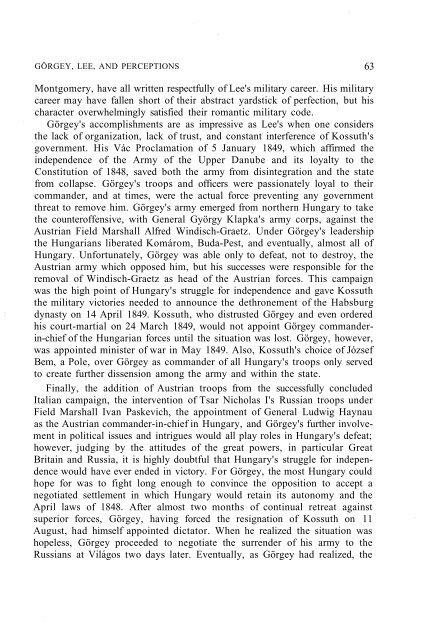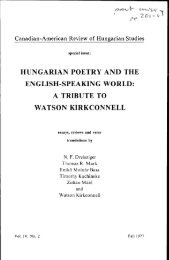62 SAMUEL J. WILSONbeings and controlling impersonal forces during a clash of arms is extremely complicatedand difficult, and successful practitioners of the art of command have been aspecial breed of men. 7As a result, it might be fitting to place Görgey in a category with Hannibal,Charles XII, Napoleon, Erwin Rommel, and Lee, all of whom fell in defeat.He should, however, at least rank in Hungarian military historiography withRákóczi. Victory requires that one opponent overmatch another in the sum ofhis generalship plus all other capabilities for waging war. Hence, if historianswant to judge Görgey fairly, they must consider the resources at his commandalong with his performance. In Görgey's case, he opposed superior forces butmanaged to hold out and inflict defeat with his ill-supplied and poorlysupported army.But all these factors cease to matter as long as Hungarians continue todebate and discredit Görgey's role in the revolution. Since Hungarians refuseto recognize his military prowess, there is little chance that foreign historianswill ever give him the recognition he deserves. In the modern western traditionit becomes necessary for nation-states to honor their own heroes beforepresenting them to the world for approval. Görgey has not passed the first andmost important hurdle of national appreciation. Karl Marx would acknowledgethat this road to the international recognition must first go the nationalroute.Lee represents, probably more than anyone else, the precise paradigm ofhow this process works. There are always two major considerations indescribing his military talents: first, he fought against the <strong>No</strong>rth, and consequently,after the Emancipation Proclamation of 1862, for the continuation ofslavery; and second, Lee is the only American general to have ever lost a war.Naturally, had the South won, neither of these factors would have mattered.Lee, however, surrendered to the Union general Ulysses S. Grant in 1865.After the war Lee became the symbol of the Lost Cause for the defeated South.They revered him to the point of worship. His birthday, 19 January, is stillcelebrated as a holiday in some former Confederate states. WashingtonCollege, where Lee served as president from the end of the war until his deatLin 1870, was later renamed Washington and Lee University. Plenty of statuesin cities and on battlefields honor his place in American history. His highpersonal character, his humility, his selflessness, and his devotion to what heconsidered his duty placed Lee in a unique position to be not only loved bysoutherners, but also respected and admired by his adversaries. Unlike Görgey,Lee passed the important first hurdle necessary for recognition. Internationally,Churchill, Sir Frederic Maurice, Cyril Falls, and even Bernard Law
GÖRGEY, LEE, AND PERCEPTIONS 63Montgomery, have all written respectfully of Lee's military career. His militarycareer may have fallen short of their abstract yardstick of perfection, but hischaracter overwhelmingly satisfied their romantic military code.Görgey's accomplishments are as impressive as Lee's when one considersthe lack of organization, lack of trust, and constant interference of Kossuth'sgovernment. His Vác Proclamation of 5 January 1849, which affirmed theindependence of the Army of the Upper Danube and its loyalty to theConstitution of 1848, saved both the army from disintegration and the statefrom collapse. Görgey's troops and officers were passionately loyal to theircommander, and at times, were the actual force preventing any governmentthreat to remove him. Görgey's army emerged from northern Hungary to takethe counteroffensive, with General György Klapka's army corps, against theAustrian Field Marshall Alfred Windisch-Graetz. Under Görgey's leadershipthe Hungarians liberated Komárom, Buda-Pest, and eventually, almost all ofHungary. Unfortunately, Görgey was able only to defeat, not to destroy, theAustrian army which opposed him, but his successes were responsible for theremoval of Windisch-Graetz as head of the Austrian forces. This campaignwas the high point of Hungary's struggle for independence and gave Kossuththe military victories needed to announce the dethronement of the Habsburgdynasty on 14 April 1849. Kossuth, who distrusted Görgey and even orderedhis court-martial on 24 March 1849, would not appoint Görgey commanderin-chiefof the Hungarian forces until the situation was lost. Görgey, however,was appointed minister of war in May 1849. Also, Kossuth's choice of JózsefBem, a Pole, over Görgey as commander of all Hungary's troops only servedto create further dissension among the army and within the state.Finally, the addition of Austrian troops from the successfully concludedItalian campaign, the intervention of Tsar Nicholas I's Russian troops underField Marshall Ivan Paskevich, the appointment of General Ludwig Haynauas the Austrian commander-in-chief in Hungary, and Görgey's further involvementin political issues and intrigues would all play roles in Hungary's defeat;however, judging by the attitudes of the great powers, in particular GreatBritain and Russia, it is highly doubtful that Hungary's struggle for independencewould have ever ended in victory. For Görgey, the most Hungary couldhope for was to fight long enough to convince the opposition to accept anegotiated settlement in which Hungary would retain its autonomy and theApril laws of 1848. After almost two months of continual retreat againstsuperior forces, Görgey, having forced the resignation of Kossuth on 11August, had himself appointed dictator. When he realized the situation washopeless, Görgey proceeded to negotiate the surrender of his army to theRussians at Világos two days later. Eventually, as Görgey had realized, the
- Page 1 and 2:
Papers of the Radnóti Memorial Con
- Page 3:
HUNGARIAN STUDIESVOLUME 11, 1996 CO
- Page 8 and 9:
6 GEORGE GÖMÖRIprobably Fürst an
- Page 10 and 11:
8 GEORGE GÖMÖRIof the utmost impo
- Page 12 and 13:
10 GEORGE GÖMÖRIén e földön...
- Page 14 and 15: 12 GEORGE GÖMÖRINotes1. Miklós R
- Page 16 and 17: 14 MIHÁLY SZEGEDY-MASZÁKself alwa
- Page 18 and 19: 16 MIHÁLY SZEGEDY-MASZÁKtype is r
- Page 20 and 21: 18 MIHÁLY SZEGEDY-MASZÁKpose, the
- Page 22 and 23: 20 MIHÁLY SZEGEDY-MASZÁK"Wozu Dic
- Page 24 and 25: 22 MIHÁLY SZEGEDY-MASZÁKand Wilme
- Page 26 and 27: 24 MIHÁLY SZEGEDY-MASZÁKbeen the
- Page 28 and 29: 26 MIHÁLY SZEGEDY-MASZÁKBolond, k
- Page 30 and 31: 28 MIHÁLY SZEGEDY-MASZÁK6. Emery
- Page 32 and 33: 30 ZSUZSANNA OZSVÁTHand breaks as
- Page 34 and 35: 32 ZSUZSANNA OZSVÁTHThe drama echo
- Page 36: 34 ZSUZSANNA OZSVÁTHcontinents at
- Page 39 and 40: FROM CAIN TO NAHUM 37which, as Csap
- Page 41 and 42: \FROM CAIN TO NAHUM 39and bears and
- Page 43 and 44: FROM CAIN TO NAHUM 41who sees what
- Page 45 and 46: FROM CAIN TO NAHUM 438. "A félelme
- Page 47 and 48: HELP ME, PASTORAL MUSE:THE VIRGELIA
- Page 49 and 50: HELP ME, PASTORAL MUSE 47compete! W
- Page 51 and 52: HELP ME, PASTORAL MUSE 49of a priva
- Page 53 and 54: HELP ME, PASTORAL MUSE 51Once again
- Page 55 and 56: HELP ME, PASTORAL MUSE 53Eighth Ecl
- Page 57 and 58: HELP ME, PASTORAL MUSE 55have that
- Page 59: HELP ME, PASTORAL MUSE 57Paul de Ma
- Page 62 and 63: 60 SAMUEL J. WILSONWe did, however,
- Page 66 and 67: 64 SAMUEL J. WILSONHungarians would
- Page 68 and 69: 66 SAMUEL J. WILSONthe Austrians. G
- Page 70 and 71: 68 SAMUEL J. WILSONnorth-eastern Zi
- Page 72 and 73: 70 SAMUEL J. WILSONoriginally pursu
- Page 74 and 75: 72 SAMUEL J. WILSONGörgey's decisi
- Page 76 and 77: 74 SAMUEL J. WILSONfrom occurring,
- Page 78 and 79: 76 SAMUEL J. WILSON8. Artúr Görge
- Page 80 and 81: 78 STEVEN TÖTÖSY de ZEPETNEKtört
- Page 82 and 83: 80 STEVEN TÖTÖSY de ZEPETNEKThe c
- Page 84 and 85: 82 STEVEN TÖTÖSY de ZEPETNEKher u
- Page 86 and 87: 84 STEVEN TÖTÖSY de ZEPETNEKthe b
- Page 88 and 89: 86 STEVEN TÖTÖSY de ZEPETNEKrooti
- Page 90 and 91: 88 STEVEN TÖTÖSY de ZEPETNEKcriti
- Page 92 and 93: 90 STEVEN TÖTÖSY de ZEPETNEK'My f
- Page 94 and 95: 92 STEVEN TÖTÖSY de ZEPETNEKshe d
- Page 96 and 97: 94 STEVEN TÖTÖSY de ZEPETNEKNotes
- Page 99 and 100: BERLIN ET PARIS DE LAJOS TIHANYIVAL
- Page 101 and 102: BERLIN ET PARIS DE LAJOS TIHANYI 99
- Page 103 and 104: BERLIN ET PARIS DE LAJOS TIHANYI 10
- Page 105 and 106: BERLIN ET PARIS DE LAJOS TIHANYI 10
- Page 107 and 108: BERLIN ET PARIS DE LAJOS TIHANYI 10
- Page 109 and 110: BERLIN ET PARIS DE LAJOS TIHANYI 10
- Page 111 and 112: BERLIN ET PARIS DE LAJOS TIHANYI 10
- Page 113 and 114: BERLIN ET PARIS DE LAJOS TIHANYI 11
- Page 115:
BERLIN ET PARIS DE LAJOS TIHANYI 11
- Page 118 and 119:
116 KEVIN E. KELLYfilms Lugosi made
- Page 120 and 121:
118 KEVIN E. KELLYthe provinces, no
- Page 122 and 123:
120 KEVIN E. KELLYWith his brief an
- Page 124 and 125:
122 KEVIN E. KELLYboth his and Dean
- Page 126 and 127:
124 KEVIN E. KELLYfollowed it into
- Page 128 and 129:
126 KEVIN E. KELLYvampiric nobleman
- Page 130 and 131:
128 KEVIN E. KELLYThe film also boo
- Page 132 and 133:
130 KEVIN E. KELLYWood remained one
- Page 134 and 135:
132 KEVIN E. KELLYLugosi, convinced
- Page 136 and 137:
134 KEVIN E. KELLY19. Lennig, 112-1
- Page 139 and 140:
THE AGON OF IRONY AND SATIREIN GYÖ
- Page 141 and 142:
THE AGON OF IRONY AND SATIRE 139poe
- Page 143 and 144:
THE AGON OF IRONY AND SATIRE 141tra
- Page 145 and 146:
THE AGON OF IRONY AND SATIRE 143fek
- Page 147 and 148:
THE AGON OF IRONY AND SATIRE 145ner
- Page 149 and 150:
THE AGON OF IRONY AND SATIRE 147whi
- Page 151 and 152:
THE AGON OF IRONY AND SATIRE 149mov
- Page 153 and 154:
THE AGON OF IRONY AND SATIRE 151for
- Page 155 and 156:
THE AGON OF IRONY AND SATIREA harma
- Page 157 and 158:
MURDER IN THE MOUNTAINSTranslated b
- Page 159 and 160:
MURDER IN THE MOUNTAINS 157"Afraid?
- Page 161 and 162:
MURDER IN THE MOUNTAINS 159Abády,
- Page 163 and 164:
MURDER IN THE MOUNTAINS 161"The mar
- Page 165 and 166:
MURDER IN THE MOUNTAINS 163Bálint
- Page 167 and 168:
MURDER IN THE MOUNTAINS 165"That is
- Page 169 and 170:
MURDER IN THE MOUNTAINS 167at hand,
- Page 171 and 172:
CONTRIBUTORSMiklós BÁNFFYLászló
















